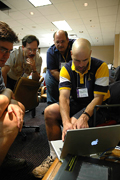The nuts and bolts of our course design workshop

This section of our web site provides details on how we run our 4-day course design workshop. If you are interested in adapting our approach for a shorter workshop or an online format, please see our description of alternatives.
Before beginning, you may wish to download the documents referred to in discussions in this section, including our PowerPoint slides (PowerPoint 1.2MB Mar16 10), the workshop assignment sheets (Acrobat (PDF) 125kB Dec22 05), a detailed workshop schedule for the summer 2005 workshop (Acrobat (PDF) 149kB Jan5 06), the format for final workshop posters (Acrobat (PDF) 19kB Jan5 06), the "daily road check" evaluation form (Acrobat (PDF) 61kB Jan4 06), and the workshop final evaluation form (Acrobat (PDF) 64kB Jan4 06).
Workshop details
You can start either by working through the details of our workshop schedule or by browsing the factors below that we believe are key elements in the success of our workshop.
Key elements
Choosing facilitators

- We typically have 1 facilitator for every 5-6 workshop participants, which allows us to have a table leader for each small group discussion who thoroughly understands the workshop. This also gives us enough facilitators with different perspectives/backgrounds to provide good feedback to individuals.
- We use facilitators who are faculty members in the disciplines represented by the participants. We have found that having content experts (faculty in science, history, or math, for example) as facilitators reaps benefits in terms of engaging faculty intellectually in the course design process. We have found this to be very successful in overcoming the resistance of many faculty members to education workshops.
- We have found that past workshop participants commonly make excellent facilitators.
Having a meeting of leaders and facilitators before the workshop
- An intensive pre-workshop facilitator meeting is crucial, because the workshop facilitators play extremely important roles in helping participants understand our course design process, in guiding small group discussions, and in helping participants when they are stuck.
- Leaders and facilitators meet for at least a half a day before the workshop to go over the workshop schedule in detail, to discuss the aims of each small group discussion and approaches to making discussions work, and to practice setting straw goals for courses and providing advice on other people's goals. We cannot overemphasize how crucial this pre-workshop meeting is. If you wish to see the details of our pre-workshop meeting, you can download a leader's schedule (Acrobat (PDF) 149kB Jan5 06).
Limiting talking heads and providing adequate work time
- Our workshop is a workshop, and one of the reasons that our participants leave our workshop having made significant progress and feel confident in following through is that we limit the amount of time that participants listen to us talk.
- We build in scheduled work time both in blocks during the day and within each session so that participants can make continual progress throughout the workshop.
Emphasizing adaptation of assignments and activities, rather than adoption

- College and university faculty rarely adopt previously-developed materials wholesale.
- We try to avoid presentations of the type "Here's what I do in my classroom" and, instead, use examples that can be generalized into strategy templates that participants can use in developing their own assignments and activities.
Providing individualized feedback
- Our workshop asks participants to challenge their assumptions about their courses, and providing advice and "tree shaking" is a crucial part of the development process.
- Participants receive feedback from each other and from facilitators early and often, both as scheduled parts of the workshop and as individual consultations with facilitators.
Offering options for teaching strategies and assessment
- Our participants commonly bring very different backgrounds to the workshop in terms of familiarity with classroom strategies other than lecture.
- Our workshop is structured to allow participants to pick and choose among a variety of sequential and concurrent sessions on classroom, assignment, and assessment strategies.
Demanding products at various stages

- Course design involves making difficult decisions. Requiring regular work products that others will provide feedback on during the workshop helps participants avoid the trap of floating through the workshop without making those hard decisions.
- Periodic work products (typically in the form of informal posters done on giant Post-It notes with markers) also provide a record for participants to use after the workshop as they follow through to develop and teach their courses.
Developing a plan of action
- On the final day of the workshop, each participant writes a plan of action that, as realistically as possible, projects what needs to be done between the workshop and the first day of classes.
- Such an action plan contributes, we believe, to the high percentage of participants who leave the workshop confident that they can follow through with their course design plans.
Go to workshop schedule details :: Go back to main developers page
____
©2005 On-line Course Design Workshop and Tutorial developed by Dr. Barbara J. Tewksbury (Hamilton College) and Dr. R. Heather Macdonald (College of William and Mary) as part of the program On the Cutting Edge, funded by NSF grant DUE-0127310.

